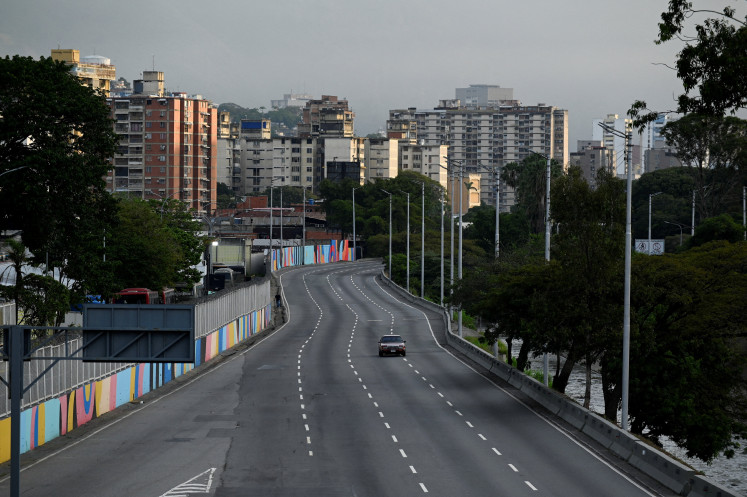Popular Reads
Top Results
Can't find what you're looking for?
View all search resultsPopular Reads
Top Results
Can't find what you're looking for?
View all search resultsRI takes monetary, fiscal measures to fight effects of virus
Indonesia is planning to roll out monetary easing and fiscal stimulus to cushion the economy from the impact of the Wuhan coronavirus
Change text size
Gift Premium Articles
to Anyone
Indonesia is planning to roll out monetary easing and fiscal stimulus to cushion the economy from the impact of the Wuhan coronavirus.
Bank Indonesia (BI) cut its benchmark interest rate, the seven-day reverse repo rate, by 25 basis points (bps) to 4.75 percent on Thursday after holding the rate in the last three months. BI Governor Perry Warjiyo said given the economic risks posed by the spread of COVID-19, there was a need to maintain economic growth.
Finance Minister Sri Mulyani Indrawati said Wednesday the government was planning a fiscal stimulus through state budget disbursement into productive spending and early incentives to strengthen the domestic economy amid slowdown risks.
“The impact of the spread of COVID-19 on the economy will be V-shaped and we forecast global economic growth to reach 3 percent in 2020 from our earlier projection of 3.1 percent,” Perry said, adding that global growth would pick up to 3.4 percent from BI’s earlier projection of 3.2 percent next year.
BI also revised down Indonesia’s economic growth projection to between 5 and 5.4 percent this year from its earlier projection of between 5.1 and 5.5 percent. The growth would pick up to 5.2 to 5.6 percent in 2021.
“The monetary policy remains accommodative and consistent with the projected inflation rate and is a preemptive measure to maintain the momentum of domestic economic growth amid a stagnated global economic recovery caused by the coronavirus,” he added.
Indonesia’s economic growth rate, which hit a three-year low of 4.97 percent in the fourth quarter of 2019, was projected to reach 5.3 percent this year as stated in the 2020 state budget. However, the country risks falling short of the target given the spread of the virus and disrupted economic activity in China.
Since it was first detected in Wuhan in late December, the pneumonia-like COVID-19 has killed more than 2,000 people, including 10 outside mainland China, as of Thursday, with the virus spreading to 30 countries and territories around the world, infecting more than 75,000 people.
The outbreak has disrupted economic activity in China, the world’s second-largest economy and one of Indonesia’s major trading partners, as factories and companies close all or half of their businesses to contain the spread of the virus amid lockdowns in several provinces. Economists have projected that the situation could lower China's economic growth by up to 1 percentage point this year.
“A drop of 1 percentage point in China’s economic growth will result in a drop of 0.3 to 0.6 percentage points in Indonesia’s,” Sri Mulyani said during a separate press briefing in Jakarta on Wednesday. “Government spending will be encouraged particularly in the first quarter of this year.”
The government's planned to accelerate its spending, which could help labor intensive sectors with capital expenditure and social aid disbursements, and boost people’s purchasing power through the preemployment card program and tourism incentives.
It has spent Rp 139.83 trillion (US$10.2 billion) as of January or around 5.5 percent of total spending this year and earned Rp 103.69 trillion in revenue, causing a budget deficit of Rp 36 trillion.
“These measures can help soften the negative impact of the coronavirus crisis,” Bank Central Asia (BCA) chief economist David Sumual said on Thursday, responding to the central bank and the government's moves.
“Indonesia’s GDP [gross domestic product] growth in 2020 may decelerate by 0.1 to 0.3 percentage point from our initial forecast of 5.14 percent due to the ongoing COVID-19 outbreak in China,” Bank Mandiri chief economist Andry Asmoro wrote in a note. “This increases the need for BI to continue its accommodative policy mix going forward.”










